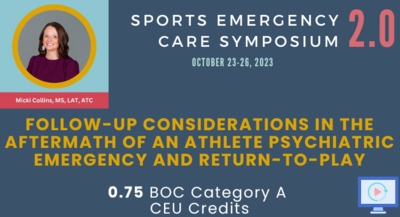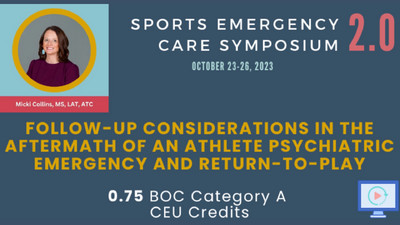Course Info (BOC Domains of Athletic Training; Presentation Description; Learning Objectives; Clinical Practice Gap Statement; Clinical Bottom Line; Summary Conclusions)
BOC Domains of Athletic Training:
- Domain Ill - Critical Incident Management
-
Domain V - Healthcare Administration and Professional Responsibility
Presentation Description:
This presentation shifts the focus to the crucial considerations that follow an athlete-related psychiatric emergency. It provides comprehensive guidelines for documenting essential information in the aftermath of such emergencies, ensuring a thorough post-emergency follow-up process. Furthermore, it emphasizes the continued collaborative approach between medical and law enforcement teams in athlete care, extending beyond the initial crisis.
Learning Objectives:
- Understand mental health challenges and the potential impact on sport the need for removal-from-play.
- Comprehend the considerations needed for safe and effective return-to-play following a mental health emergency in athletic settings.
- Understand the factors that are beneficial to create a management plan following a mental health emergency in athletic settings.
Clinical Practice Gap Statement:
Within the athletic environment, follow-up and documentation protocols for psychiatric emergencies are often overlooked, creating legal and ethical vulnerabilities. The lack of standardized methods for sustained collaborative care impacts the quality of athlete management during psychiatric emergencies and return-to-play considerations.
Clinical Bottom Line Statement:
Robust follow-up protocols, encompassing meticulous documentation and a multi-disciplinary collaboration involving athletic trainers, medical personnel, and law enforcement, are paramount for optimizing care quality and minimizing legal pitfalls following athlete-related psychiatric crises. These elements form the cornerstone of effective post-emergency care in athletic settings.
Summary Conclusion Statements:
- Comprehensive documentation post-psychiatric emergency is vital in upholding both legal and professional guidelines within athlete healthcare.
- Adequate documentation of any use of restraints, and continuous engagement with medical and law enforcement teams, enhances ongoing quality of care for athletes.
- A holistic, collaborative methodology is essential for the effective resolution and favorable outcomes in athlete psychiatric emergencies, and this must continue well past the initial response to the crisis.


